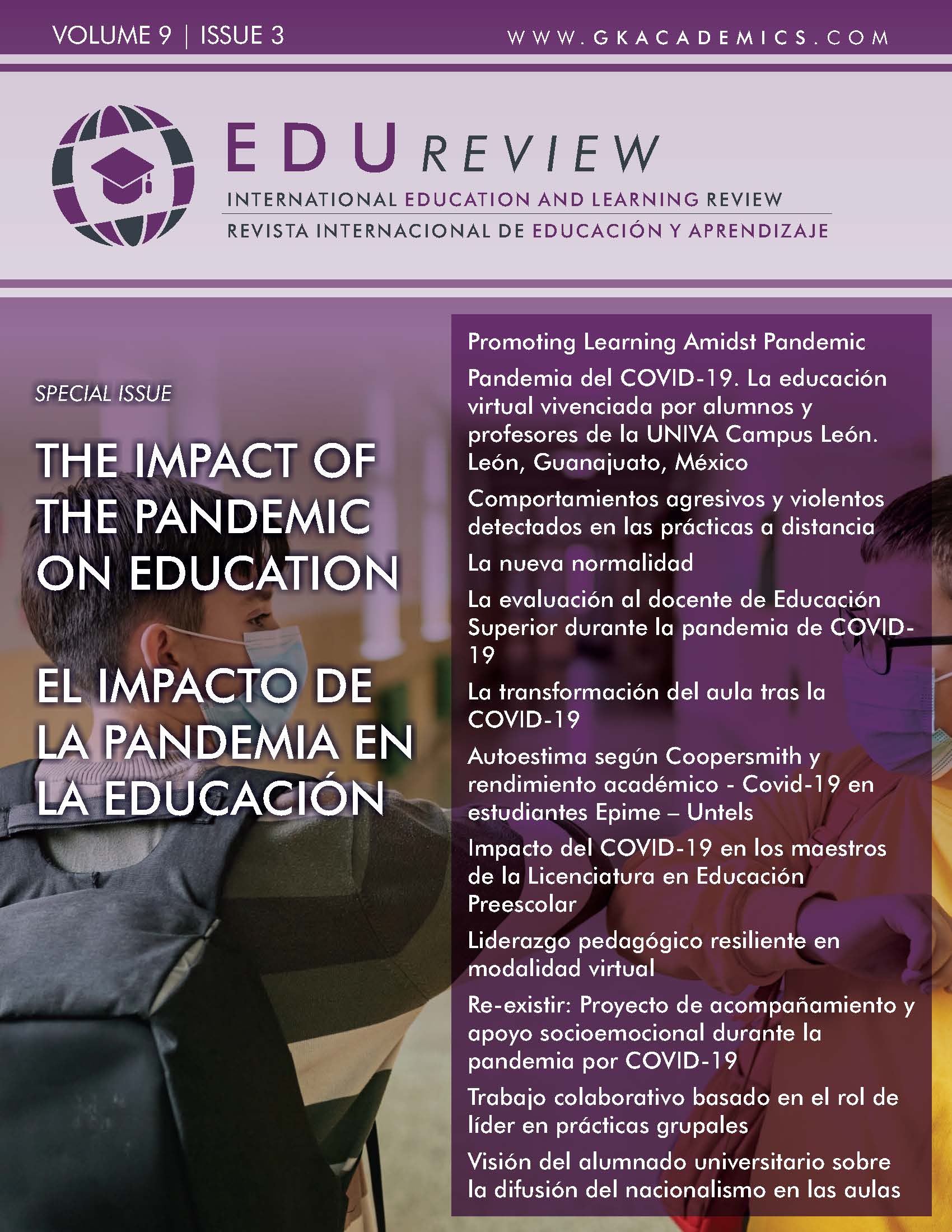Re-existing: Social and Emotional Support Project during the COVID-19 Pandemic
Aimed at High School Students
DOI:
https://doi.org/10.37467/gkarevedu.v9.3143Keywords:
Education, Pandemic, Project, Socio-emotional support, TIC, LearningAbstract
The pandemic has made the Education to switch to the use of TIC as a way of reaching the students despite isolation. However, students showed absence and even temporary dropout from school due to personal reasons related to an emotional imbalance. Due to this, Preparatoria Interamericana decided to open a space which will bring freedom and will give space to students for them to voice their fears, needs and worries. The project is called Re-existing. Planned and aimed at social and emotional support systems. This project will be useful both for our current emergency circumstances and the future of education.
Downloads
Global Statistics ℹ️
|
694
Views
|
314
Downloads
|
|
1008
Total
|
|
References
Bisquerra, R. (2000). Educación emocional y bienestar. Praxis.
IASC (2007). IASC Guidelines on Mental Health and Psychosocial Support in Emergency Settings. Inter-Agency Standing Committee.
INEE (2018). Nota de orientación de la INEE sobre Apoyo Psicosocial. Facilitando el bienestar psicosocial y la psicoeducación. New York: Red Interinstitucional para la Educación en Situaciones de Emergencia.
Organización de las Naciones Unidas. (s.f.). Objetivos de desarrollo sostenible. ONU. https://www.un.org/sustainabledevelopment/es/education/
Population Council. (2021). VoCes-19. Resultados Ronda 1: Experiencias de más de 55, 000 adolescentes y jóvenes en México. https://vocescontralaviolencia.org/wp-content/uploads/2021/10/Informe-Ejecutivo-VoCes19-Ronda1.pdf
Sebastián, C., Gallardo, G. y Calderón, M. (2016). Sentido identitario de la formación. Una propuesta para articular el desarrollo de la identidad y el aprendizaje en contextos educativos. Papeles de Trabajo sobre Cultura, Educación y Desarrollo Humano, 12(3), 4-12.
Serra, C. (2004). Etnografía escolar, etnografía de la educación. Revista de Educación, 334, 165-176.
Soto-Córdoba, I. (2020). La relación estudiante-docente en tiempos de cuarentena. Desafíos y oportunidades del aprendizaje en entornos virtuales. Revista Saberes Educativos, 5, 70-99. DOI: https://doi.org/10.5354/2452-5014.2020.57816
UNICEF. (2021). Sostener, cuidar, aprender. Lineamientos para el apoyo socioemocional en las comunidades educativas. Chile. https://www.unicef.org/chile/media/5701/file/Sostener%20cuidar%20.pdf
Universidad de Chile. (2020). Salud mental en situación de pandemia. Documento para mesa social Covid-19. Chile. https://cdn.digital.gob.cl/public_files/Campa%C3%B1as/Corona-Virus/documentos/Salud_Mental_V2.pdf
Vivas García, Mireya (2003). La educación emocional: conceptos fundamentales. Sapiens. Revista Universitaria de Investigación, 4(2),0. https://www.redalyc.org/articulo.oa?id=410402
Downloads
Published
How to Cite
Issue
Section
License
Those authors who publish in this journal accept the following terms:
-
Authors retain copyright.
-
Authors transfer to the journal the right of first publication. The journal also owns the publishing rights.
-
All published contents are governed by an Attribution-NoDerivatives 4.0 International License.
Access the informative version and legal text of the license. By virtue of this, third parties are allowed to use what is published as long as they mention the authorship of the work and the first publication in this journal. If you transform the material, you may not distribute the modified work. -
Authors may make other independent and additional contractual arrangements for non-exclusive distribution of the version of the article published in this journal (e.g., inclusion in an institutional repository or publication in a book) as long as they clearly indicate that the work was first published in this journal.
- Authors are allowed and recommended to publish their work on the Internet (for example on institutional and personal websites), following the publication of, and referencing the journal, as this could lead to constructive exchanges and a more extensive and quick circulation of published works (see The Effect of Open Access).













